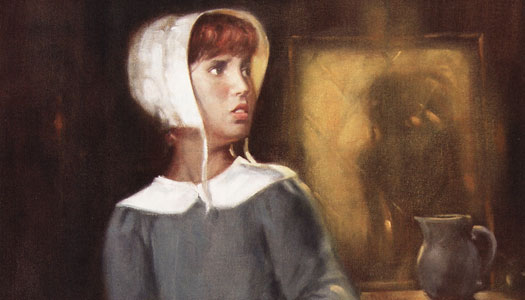Plymouth Plantation, 1634.
Nine-year-old Mercy Bradford was shaking out a wool rug when she saw the Indian walking up the lane. Folding the rug in half, she hurried inside and bolted the door.
What is an Indian doing inside the plantation gates? she wondered, wishing she weren’t home alone.
Putting the worries out of her mind, Mercy turned her efforts toward the evening meal. She hummed a hymn as she prepared corn dumplings. When she looked up from her bowl, something caught her eye. The Indian! He stood in front of the window, trying to peer inside.
Does he know all the men are at the fort practicing their shooting in case there’s a war with the Indians? Mercy thought. Is that why he’s come now, when there is no one to stop him?
His long hand motioned toward the door. Mercy’s heart pounded with fear. What should I do?
She tried to get a better look at the man to see what tribe he was from. But the thick oiled paper that covered most of the colonists’ windows didn’t allow much light through. Mercy could only see a vague outline of the Indian and the feathers in his braids.
She decided to ignore him and went back to her dumplings, but more thoughts nagged her. What if he’s a messenger looking for Father? What if I make him angry and he comes back with more of his tribe? What if William and Joseph have been hurt while guarding the cattle and he’s come to tell me?
She said a little prayer to God her protector and slid back the bolt.
Needy Neighbor
When she opened the door, Mercy almost screamed at the sight of the man’s face, disfigured by hundreds of deep, round scars. He leaned forward, his dark eyes bulging out of their sockets. She could feel his warm breath.
“Corn,” he said.
“Corn?” Mercy repeated, almost in shock.
She kept staring at him. Scars covered his arms as well, which were as thin as broomsticks.
Smallpox.
The tribe that lived near the trading post had recently been all but wiped out by the disease. Several of the colonists had nursed the Indians in their misery, giving them sheets, bathing them, feeding them, providing clean water and burying the dead. The Indians had been so ill that they had been unable to tend to their crops and had no food stored for the winter.
“Corn.” The Indian nodded his head and stretched his arms wide to show that he wanted a lot.
Mercy didn’t even have to guess what her father would want her to do. She went to her family’s food supplies. One by one, she brought out three large baskets filled with ground corn.
The Indian didn’t exactly smile when she brought them, but his expression changed to relief. He stacked up the baskets and carried them away.
As he walked away from the Bradford house, Mercy watched until his feathers were out of sight. Then she shut and bolted the door.
Missing Meal
“Father’s going to put you in the stocks for being so wasteful.” William Jr. stared disapprovingly at his sister. He had just returned from the cattle pastures. “The corn crops were bad this year. There’s practically none left in the storehouse. And you—you gave our winter rations to an Indian.”
William Jr. didn’t like the taste of rye or wheat, which was all that was left for bread. He stomped over to a chair by the fire and plopped down, grumbling to his 7-year-old brother, Joseph, about the lost corn.
Mercy pretended not to hear him as she spread a brown tablecloth for the evening meal. But a seed of fear that she had done the wrong thing took root in her mind.
What will Father say? She pushed aside the thought and continued cooking, taking comfort in humming her favorite hymn.
Soon the rest of the family returned, and the small house was filled with eight hungry people. After Mr. Bradford had given thanks to God for the food Mercy had prepared, the family sat down to eat.
William Jr. took a big bite from his corn dumpling, swallowed with a big gulp and said, “Better enjoy these corn dumplings. They’re the last until next year’s harvest because Mercy gave all our corn to an Indian!”
Eighteen-year-old Thomas frowned, putting down his pewter cup. He turned to Mercy. “An Indian came here?”
She nodded. Thomas grunted and said, “It won’t be long before we are at war because the Connecticut Indians refuse to honor the treaties.”
Mercy bowed her head, her face mostly covered by her crisp white bonnet. Mr. Bradford put a reassuring hand on her shoulder.
“Now, Thomas,” Mr. Bradford said, “the Connecticut Indians have real grievances. They were defending themselves against a man known to be a thief and a murderer. There’s more to it than a broken treaty.”
“But still,” Thomas said, “Mercy should have raised an alarm. These days no Indian should dare come into our colony without permission.”
This met with hearty approval from all five of Mercy’s brothers.
“You would bring the whole militia down to kill one Indian?” Mercy asked without looking up. “This one was a Massachusetts Indian, weak from smallpox. Little Jo could have knocked him over with a poke of his finger.”
Mrs. Bradford stood and went to the storage area. She came back and said, “All my baskets are gone! Mercy, how will I replace them? You should have asked first.”
Mercy’s head bowed lower.
Giving the Best
At that, all five brothers complained freely about the lost corn. Finally, Mr. Bradford stood. He stared down at his sons until everyone was quiet.
“I will not have you speak so,” he said. “None of you were here that first winter, when the Indians showed us mercy beyond measure. They saved our lives by sharing their food and teaching us how to plant. That winter we would have been grateful to sip one spoonful of chicken broth—and here before you sit three whole birds. Let us open our hearts in gratitude to God that we have more than enough food to share with our neighbors.”
The boys looked stunned, but soon table talk turned to other subjects, such as Pastor Smith’s last sermon and the coming winter storm.
While Mercy was boiling down the chicken carcasses after dinner, her father put his arm around her.
“You are well named, Mercy,” he said. “May our Lord Jesus be as kind to you as you were to the stranger.”
Mercy went back to her duties, humming a lively song. She would rather have the praise of her father than all the corn dumplings in the world.
William Bradford: Rock of Plymouth
William Bradford, who sailed on the Mayflower in 1620, helped shape North America’s democratic government and was also a generous Christian. He had four children, adopted two sons and took in several orphans.
Bradford was elected governor of Plymouth for 30 terms. He received no money for serving in this position. While he was governor, treaties with the Wampanoag Indians were never broken.
Bradford often gave away food, beaver skins and other forms of “money” to known enemies.
Squanto, one of the natives who helped the Pilgrims survive that first winter, was Bradford’s friend and even lived in Bradford’s house.













